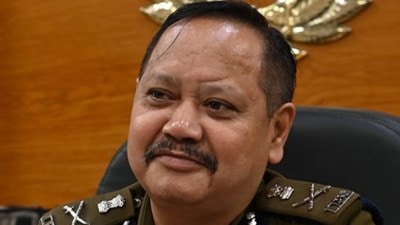Salman Rushdie hits back at troll for post on his eye
Since the attack, Salman Rushdie, whose novel 'Victory City' came out earlier this year to critical reception, has made very few public appearances.
 Author Salman Rushdie is seen in this photo he shared of himself on Twitter.
Author Salman Rushdie is seen in this photo he shared of himself on Twitter. DAYS AFTER his interview to BBC News in which he spoke of the recurring pattern of “crazy dreams” that continue to besiege him almost a year after a near-fatal attack on him in New York last August, author Salman Rushdie was at the receiving end of another attack, this time on social-media platform Twitter, threatening bodily harm.
In response to a congratulatory message for being made a Companion of Honour by the British Princess Royal Anne at an investiture ceremony at Windsor Castle in May, a user @MohammedFlaifil wrote “Yep, may be when we get rid of his other eye, he’ll get another medal.”
As other users came to Rushdie’s defence condemning and reporting the handle, the 76-year-old British-American writer of Indian origin called out the user on his tweet in his inimitable way: “Who is ‘we’ in that sentence, m**********r?”
Last August, the India-born British-American author was at the Chautauqua Institution in New York, waiting to deliver a lecture on the importance of the US offering asylum to artistes in exile, when he was stabbed multiple times by a young man, Hadi Matar. The attack resulted in Rushdie being in hospital for six weeks, emerging eventually with a paralysed hand with extensive nerve damage, loss of vision in one eye and damage to his liver.
Matar, who has been charged with attempted murder has since pleaded not guilty.
In the BBC interview, the author of the Booker Prize-winning ‘Midnight’s Children’ said, “There’s one bit of me that actually wants to go and stand on the court and look at him and there’s another bit of me that just can’t be bothered… I think what is important to me now is that you’re able to find life continuing. I’m more engaged with the business of, you know, getting on with it.”
Since the attack, Rushdie, whose novel ‘Victory City’ came out earlier this year to critical reception, has made very few public appearances. He made an exception to receive the Centenary Courage Award from PEN America in May, an organisation that he had served as president between 2002 and 2006.
In the BBC interview, Rushdie added that he has set aside another work to write about the attack on him in an attempt to make sense of it. “There’s this colossal elephant in the room and, until I deal with that, it is difficult to take seriously anything else,” he said.
An advocate of free speech, Rushdie has faced many threats to his life since the publication of ‘Satanic Verses’ in September 1988. On February 14, 1989, Iran’s religious leader Ayatollah Khomeini pronounced a fatwa on Rushdie for “insulting” Islam in ‘Satanic Verses’. The repercussions of this continued to be felt for decades afterwards. Even as Rushdie went into hiding following the fatwa, book burnings, bans and death threats continued for years. It was only after 1998 that Rushdie re-emerged in public life.



- 01
- 02
- 03
- 04
- 05




























